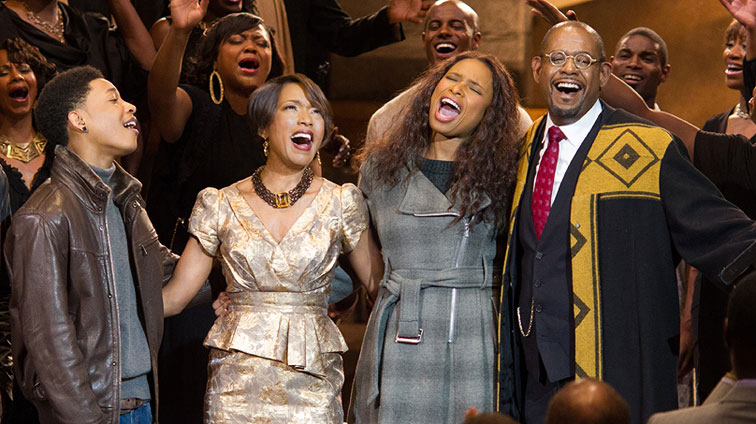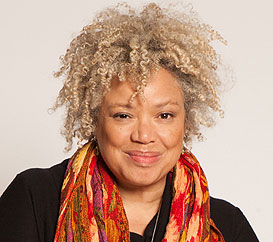
A Song of Harlem
After six years out of the spotlight, Kasi Lemmons returns with an adaptation of Black Nativity, the hit musical by legendary Harlem Renaissance poet Langston Hughes.
 Fox Searchlight
Kasi Lemmons
Fox Searchlight
Kasi Lemmons
What I tell my students is, You should try to write something that has personal resonance. I don't think it needs to be autobiographical, necessarily, but it needs to be from the heart.
When Eve's Bayou filmmaker Kasi Lemmons was 12 years old, she wrote a novel, unaware that most of her peers were still playing hopscotch and collecting baseball cards. "I was always an avid reader," recalls the writer-actress-director, "and I, basically, wrote the novel that I really wanted to read. I'm sure it had princesses and knights and magic spells in it. But that's still what I do when I sit down to write What's the story I'd want to experience?"
That singular passion and purpose explains why it's been six years since Talk to Me, Lemmons' most recent writing and directing project; she was crafting Black Nativity, a passion project, based on the off-Broadway hit musical by legendary poet Langston Hughes. Nativity, which opens in theaters on November 27, is exactly the kind of story Lemmons wanted to experience, a hopeful, universal tale of family, forgiveness, and love, starring an Oscar-kissed cast of Forest Whitaker, Angela Bassett, and Jennifer Hudson.
Welcome back! It's been too long.
It's so funny, when directors "disappear" for long periods of time, audiences can begin to wonder "what's the wait," and the truth is: most of the time, we're just working really hard trying to make the movie we want to make. You kind of forget how much time has actually gone by. So I've been making Black Nativity for five years.
This is a real passion project for you. What's your entry point to Black Nativity?
I grew up in Boston, which was a major venue for the play back in the 60s and 70s. I had definitely been exposed to do it, which is why when one of the project's producers asked me if I'd be interested in making it as a film, I said yes right away. I remembered the pageantry and the music, and how rousing it was. And I'd always wanted to do a musical, which might surprise some people, and this was the one for me.
It is something of a surprise that you've always wanted to make a musical. There was not a lot of singing and dancing in Eve's Bayou.
I've always loved musicals. I grew up loving them. A lot of them are extremely important to me. Some I just love and some deeply resonate for me. I absolutely love Once, All That Jazz, Jesus Christ Superstar, movie musicals like that. I can watch them over and over again. I wanted to try it on. I knew it would be a challenge that would help me grow and give me some great adventures, and I was hoping I'd be able to collaborate with some great musicians which I did.
As a screenwriter, how did you approach the source material?
When I read the play, I realized how much pageantry there was and how little story there was, and I quickly realized I had to find a story to tell. So I wrote about things I was passionate about family and forgiveness and healing and integrated those themes with what Langston Hughes did on stage, infusing it all with a sense of place and a sense of history and a strong visual sense.
When we talk about Langston Hughes, we're talking about one of the great poets of the 20th century. Does reverence get in the way when you're writing a screen adaptation of his play?
I'm a huge, huge fan. He's actually an important part of my life. I actually live right around the corner from where he lived. His influence and what he meant to America and to African Americans at that point of time and continuing on, he's very, very important to me. I felt like I wanted to pay homage to him in a few different ways not just with the production of Black Nativity inside the film, but with the way the film looked and felt. I wanted it to have a Langston Hughes-ness.
How do you crack open that play for the big screen?
I quickly realized that I probably couldn't do a literal translation to the screen. The play fulfills a very specific purpose. It's a pageant. There's not much story. It's meant to celebrate the African-American church and Christmas, in general. So I did something else; I wrote a story that has Black Nativity in it. It's about people and a family putting on a production of Black Nativity. Yet, the story is infused with the spirit of the original play and with the spirit of Langston Hughes.
You've done other adaptations before Caveman's Valentine and the forthcoming, Agaat. Is this a different type of writing than when you're creating from scratch?
I have done a lot of adaptations that haven't been produced, or are yet to be produced, and I very, very much enjoy it. I love trying to distill the essence of a book and make it filmic. It's a very wonderful, challenging process. It's always different. Some things translate very easily. Some things are kind of unwieldy. Black Nativity was a real challenge because it needed a story.
I've interviewed many authors about their perspective on Hollywood adaptations. One comment that sticks in my mind is James Ellroy, who said, essentially, "I just put the book in a car and shove it off a cliff. When Hollywood gets involved, it ain't mine anymore."
[Laughs] Toni Morrison said something really interesting to me once. She said, "A book is as much like a screenplay as it is like a poem." They're just completely different art forms. Certainly in adapting Black Nativity, what I wanted was the spirit of the piece: Langston, Harlem, a time capsule, with a timeless vision of what it means to be a family and to put on a production of Black Nativity.
With musicals, you need to set up the musical cues, the songs need to advance the narrative. How different is it writing a musical than something like Eve's Bayou or Caveman's Valentine?
I wrote lyrics into the script, but I'm not a lyricist. When I brought on [Grammy-winning music producer] Raphael Saadiq, he transformed those lyrics into songs. What I did was just kind of poetry that moved the story forward and worked thematically. When I was asking him to write a song, there was already a lyrical basis. At heart, this song needs to say this. So the songs were already structured, thematically and from a character point of view. Basically, Raphael had to be inspired by that and stay true to what we were trying to say.
There are urban legends about Jerry Bruckheimer insisting on action beats every 10 minutes in the films he produces. Is there such a thing as musical beats when you're working on a project like Black Nativity?
To some extent, yes. We definitely thought about how much music would be in the movie and how many songs there would be and where they would go. We didn't follow any strict guidelines. The songs went where it felt, from a story point of view, the songs should go. So there are some long stretches without song, and then once we get into the actual pageant, we do song after song after song. It happened very organically.
You've got such an exceptional cast for this film, and Forest Whitaker, who's having another grand year, has got some serious pipes.
I did know that going in. I was looking for an actor who could sing. I researched it, and I knew he could sing, and I wanted him for the movie. I told Raphael, "Treat him like a singer." With Angela Bassett, I knew she could sing, too. An amazing singer. We've got a tremendous combination of professional actors and singers in this film.
Some people might not remember that you started off as an actress, playing roles on As the World Turns and in films like Silence of the Lambs and Candyman. How did performing affect or influence your work as a writer?
I actually feel it's a natural marriage writing and acting. It makes sense to me. I couldn't have predicted the course my career has taken, but it also does kind of make sense to me. I've always been a writer. I've always been an actor. That I came to directing is kind of the intersection of those two things.
You've said you've always been a writer. How long is "always"?
Well, I wrote a novel when I was 12! [Laughs] So I knew that I was a writer. Then, when I was in my 20s, a young actor in New York, surrounded by friends in acting class, we were getting burned-out on doing the same scenes and monologues the new David Rabe, or whatever. The standard material. So I started writing scenes for friends to do in acting class. They were stand-alone scenes that felt like they were a part of a larger piece. And acting teachers started asking, "Who wrote this?" The fingers started pointing at me. So I started taking it more and more seriously, and I made a short film and then I got an interview at The Cosby Show, but they didn't want a director. They needed a writer. So I wrote a scene for Bill Cosby, and I got a job with Bill Cosby, and that led to my first professional work. That was 1988. Bill Cosby gave me my big break.
What advice would you have for up-and-coming writers?
Well, I teach at NYU and what I tell my students is, "You should try to write something that has personal resonance. I don't think it needs to be autobiographical, necessarily, but it needs to be from the heart especially when you're starting out. Use your life, your memories, your senses, your impressions as inspiration."
How does that advice change as a writer's career evolves when things like "career" and "job" enter into the mix?
I don't know that it does. I mean, we all have choices to make about what we're going to write, what job we're going to take, what a so-called career looks like. Everything that I write is personal. I have to have some kind of personal connection, or I won't take a job. That said, at this point in my life, I can find a way to make many, many things personal, which attracts me to a lot of different kinds of stories. In some ways, with my work today, my biggest fingerprint is my point of view.
What can audiences expect from Black Nativity?
It's about family and faith and forgiveness. It's rooted in our time, and yet it's timeless. It's something everyone can relate to, I believe, and it's perfect for the holiday season. I think people will really love this movie.
© 2013 Writers Guild of America West
